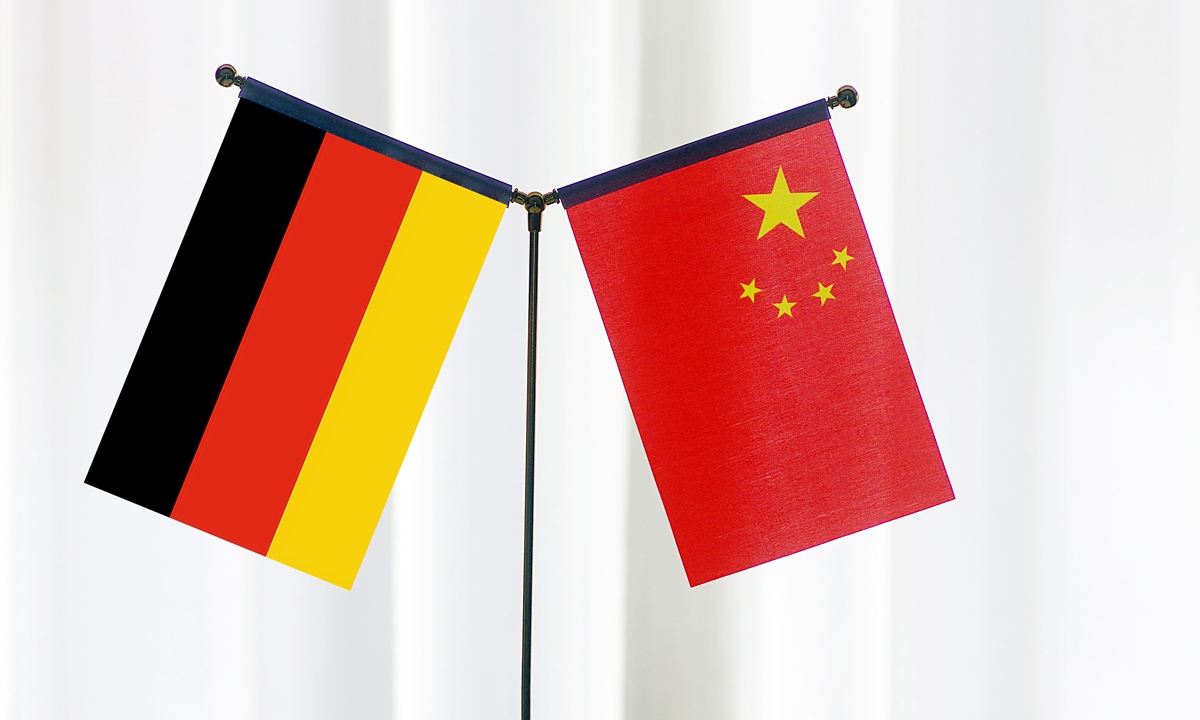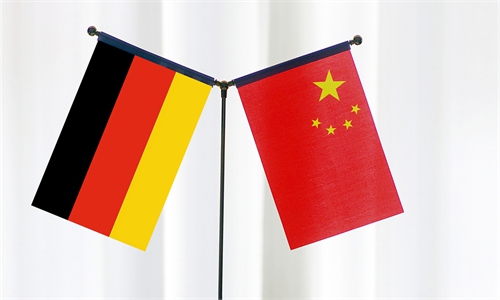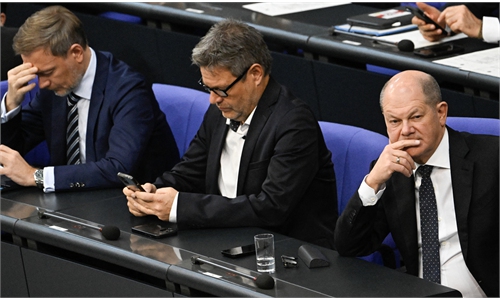Scholz to visit China in spite of ‘de-risk’ voices
‘Practical cooperation between Germany and China able to drive China-EU ties’

China Germany Photo:VCG
Despite calls to decouple from China, German Chancellor Olaf Scholz is set to embark on a three-day visit to China with the aim of shoring up ties with the country, fostering areas of practical cooperation, Chinese observers noted as the leader prepares to arrive on Sunday.
Experts stated that China's bilateral practical cooperation with the economic powerhouse Germany has the potential to cut through "de-risking" voices and further enhance China-EU relations. During Scholz's visit, China and Germany are expected to sign a series of agreements, enhancing collaboration in sectors such as renewable and clean energy.
At the invitation of Premier Li Qiang of the State Council, German Chancellor Scholz will embark on an official visit to China from April 14 to 16, Mao Ning, a spokesperson from the Chinese Foreign Ministry announced on Friday.
Scholz will meet with President Xi Jinping during his visit. Premier Li Qiang will also hold talks with the German leader to exchange views on bilateral relations and issues of common concern.
The chancellor is also expected to travel to Southwest China's Chongqing and deliver a speech at a university in Shanghai. In addition to trade matters, discussions will also address the ongoing conflict in Ukraine, according to Steffen Hebestreit, spokesperson for the German government.
"Currently, Germany is facing serious internal and external challenges. Scholz's visit to China holds significant political significance," Zhao Junjie, a research fellow from the Chinese Academy of Social Sciences' Institute of European Studies, told the Global Times on Friday.
Domestically, its GDP growth rate is relatively low at the moment, combined with high inflation and other factors, such as industrial relocation following the Russia-Ukraine conflict. This has led to negative sentiment as Germany also insisted on following the actions of the US. Additionally, many manufacturing industries in Germany are currently reluctant to invest domestically, including companies like Siemens and Volkswagen, Zhao noted.
Scholz is reportedly travelling with CEOs from leading German companies during his trip, including top executives like Roland Busch from Siemens, Ola Kaellenius from Mercedes-Benz, and Belen Garijo from Merck KGaA.
"The most important outcome of Scholz's visit will be to establish a solid basis for cooperation and exchange. We hope that by personal exchanges across a range of different topics, a mutual understanding of key issues can be achieved," Maximilian Butek, chief representative of the delegation of German Industry and Commerce in Shanghai, told the Global Times.
Speaking from the perspective of German companies, those would include topics related to trade and implementing a level playing field for foreign companies in China, Butek said.
Since last year, the EU has put forward a so-called "de-risk" and "cooperation, competition and partnership" position in regard to China. Meanwhile, the US continues to hype the challenges that China's economy poses to the US and Europe, with some voices claiming that the EU might cooperate with a US review into China-related supply chains launched in December and investigate EU companies' purchases of Chinese-made chips.
"Rather than being politically kidnapped by certain factions calling for decoupling from China or catering to media unfriendly to China, the pragmatic Scholz has realized that embarking on a diplomatic track that balances bilateral interests with China is the way out for him to address both internal and external challenges," Zhao told the Global Times.
In 2023, Germany's foreign direct investment in China reached a peak. The latest annual Business Confidence Survey by German Chamber of Commerce in China showed many companies expressed confidence in China regaining robust growth within the next five years.
"Scholz values pragmatism. I believe that the Chinese and German governments will definitely sign a series of bilateral agreements, in sectors such as renewable energy and clean energy, as well as finances and technology. This agreement may bring greater benefits to Germany," Zhao said.
China always views Germany as its important partner of mutually beneficial cooperation and supports Germany in playing a more important role in Europe and the wider world. China and Germany have benefited from each other's development which has contributed to the welfare of both peoples. The two countries have steered China-EU relations on a steady and sustained course and injected more stability to the world, Mao said.
Observers project that Germany's pragmatism will overcome containment, ideological conflicts and have a halo effect, contributing to the healthy development of China-EU relations, Zhao noted.
"The relationship between China and Europe mainly depends on the twin engines of Germany and France. If Germany can cooperate pragmatically with China and achieve results, then next, France will follow," Zhao noted.
As Foreign Minister Wang Yi stated on April 1, since the beginning of this year, China and the EU have restarted exchanges at all levels and carried out all-round cooperation in various fields. Europe has a more rational understanding of China and a stronger willingness to cooperate with China.
"Amidst the prevailing uncertainty, the resilience of bilateral economic and trade cooperation will remain unchanged. Whether it is at a steady or slow pace, progress will continue. Eventually, it will be understood that pragmatic cooperation will be the mainstream position between China and Germany, and containment or ideological conflicts are fleeting," Zhao said.



